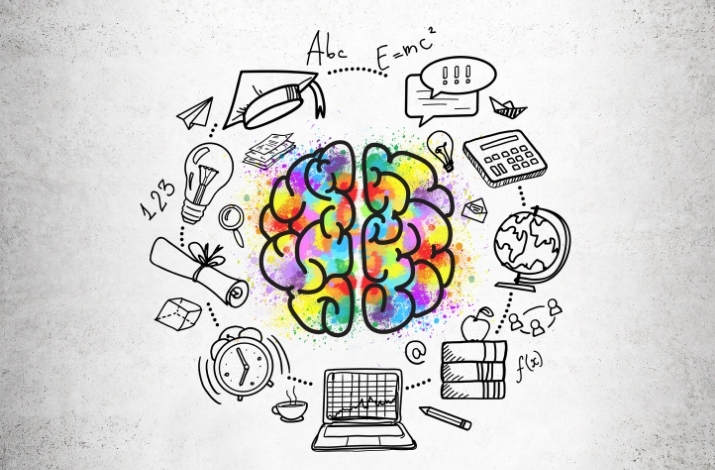The Brain Loves Fat

The Brain Loves Fat
Did you know that your brain is made up of almost 60% percent fat and contains 25% of the body’s cholesterol [1]? Let’s explore the roles that fatty acids and cholesterol play in the brain, as well as how to implement them into your daily diet.
Fatty Acids and The Brain
Not only is the brain made up of fats, but it also requires essential fatty acids (EFA’S) to perform optimally. The brain loves these fatty acids so much that clinical observations have shown deficiency in these dietary fats have been related to lower cognitive performance and a higher prevalence of disease [2]. These EFA’s are not made in the body, and therefore can only be obtained by eating these fats through the form of food. The three main essential fatty acids come from omega-6’s (linoleic acid) and omega-3’s (α-linolenic acid, eicosapentaenoic acid (EPA), docosahexaenoic acid (DHA)).
The important role these play begins at the very earliest stages of development. Higher levels of EPA and DHA levels in pregnant women have related to higher scores on intelligence and brain functioning for their children [3,4]. Their importance continues through development and into adulthood. Lowered DHA in the brain demonstrated a decline in memory and learning when animals were fed diets lacking in omega-3 fatty acids [5,6]. Throughout adulthood and into older age, these same levels of low DHA have been associated with accelerated brain aging by revealing a smaller brain size [7].
Let’s Chat Cholesterol
Fatty acids aren’t the only thing the brain thrives on. Cholesterol is another key molecule in brain health. Cholesterol has many functions, but one of them is to facilitate the communication process for dopamine and serotonin, two crucial neurotransmitters. It’s also an important piece of the myelin sheath, which is a coating on neurons in the brain that help with processing speed.
So what happens if our cholesterol is too low? A 1999 Duke University study looked at healthy young women and found that those of them with lower cholesterol levels were actually at higher risk of experiencing symptoms of depression and anxiety [8]. Data from the Multiple Risk Factor Intervention Trial study was analyzed by researchers at the University of Minnesota and found that those with low cholesterol were more likely to commit suicide vs. higher cholesterol counterparts. Another angle is to look at the cognitive function of those with lower cholesterol levels. Data from the Framingham Heart Study was observed and researchers found that lower total cholesterol numbers, “are associated with poorer performance on cognitive measures, which place high demands on abstract reasoning, attention/concentration, word fluency, and executive functioning [9].” Conversely, higher cholesterol later in life was associated with less risk for dementia [10].
Take Action
Now that you understand how important dietary fats and cholesterol are to the brain, let’s look at strategies you can use to give your brain the best nourishment. Any dairy, meat, fish, or eggs will have cholesterol, which helps the brain. For the extra fat bonus of omega-3 fats, focus on mackerel, salmon, seabass, oysters, sardines, shrimp, trout, seaweed and algae, chia seeds, hemp seeds, flaxseeds, and walnuts. Pair these protein and seafood choices with a vegetable of choice or sprinkle the seeds over a bed of greens.
References
- Björkhem, I., & Meaney, S. (2004). Brain Cholesterol: Long Secret Life Behind a Barrier. Arteriosclerosis, Thrombosis, and Vascular Biology, 24(5), 806-815. doi:10.1161/01.atv.0000120374.59826.1b
- Chang, C. Y., Ke, D. S., & Chen, J. Y. (2009). Essential fatty acids and the human brain. Acta neurologica Taiwanica, 18(4), 231–241.
- Helland IB;Smith L;Saarem K;Saugstad OD;Drevon CA;. (n.d.). Maternal supplementation with very-long-chain n-3 fatty acids during pregnancy and lactation augments children’s IQ at 4 years of age. Retrieved from https://pubmed.ncbi.nlm.nih.gov/12509593/
- Oken, E., Wright, R. O., Kleinman, K. P., Bellinger, D., Amarasiriwardena, C. J., Hu, H., Gillman, M. W. (2005, October). Maternal fish consumption, hair mercury, and infant cognition in a U.S. Cohort. Retrieved from https://www.ncbi.nlm.nih.gov/pmc/articles/PMC1281283/
- RS;, S. A. (n.d.). Omega 3 fatty acids and the brain: Review of studies in depression. Retrieved from https://pubmed.ncbi.nlm.nih.gov/17392137/
- SM;, I. (n.d.). Dietary (n-3) fatty acids and brain development. Retrieved from https://pubmed.ncbi.nlm.nih.gov/17374644/
- Tan, Z. S., Harris, W. S., Beiser, A. S., Au, R., Himali, J. J., Debette, S., . . . Seshadri, S. (2012, February 28). Red blood cell ω-3 fatty acid levels and markers of accelerated brain aging. Retrieved from https://www.ncbi.nlm.nih.gov/pmc/articles/PMC3286229/
- Women With Low Cholesterol may be at Risk for Depression and Anxiety. (n.d.). Retrieved from https://corporate.dukehealth.org/news/women-low-cholesterol-may-be-risk-depression-and-anxiety
- Elias PK;Elias MF;D’Agostino RB;Sullivan LM;Wolf PA;. (n.d.). Serum cholesterol and cognitive performance in the Framingham Heart Study. Retrieved from https://pubmed.ncbi.nlm.nih.gov/15673620/
- Mielke, M. M., Zandi, P. P., Sjögren, M., Gustafson, D., Östling, S., Steen, B., & Skoog, I. (2005, May 24). High total cholesterol levels in late life associated with a reduced risk of dementia. Retrieved from https://n.neurology.org/content/64/10/1689
This article is for informational and educational purposes only. It is not, nor is it intended to be substitute for professional medical advice, diagnosis, or treatment and should never be relied upon for specific medical advice.


















